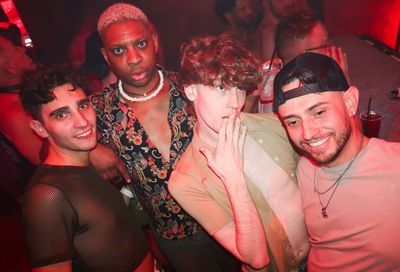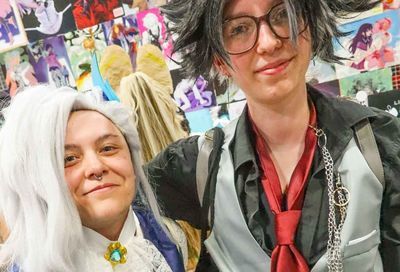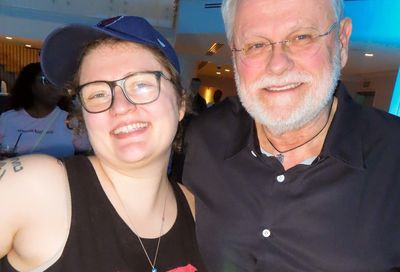Friends and Front Pages
Commentary: Stonewall Baby
As the National Lesbian and Gay Journalists Association brings its national convention back to D.C., my travel plans have me elsewhere. That’s unfortunate, as I enjoyed the one I attended a few years back in New York. But it’s the only opportunity I have to visit a friend who recently became the sole pediatrician on one of Florida’s barrier islands and, as such, he’s not able to travel more than half an hour away from the practice. My values rank friendships higher than professional development, so away I go.
That choice reminds me of my newspaper internship.
I’ve wanted to be a journalist of some sort since my father first introduced me to the Belgian cartoon character, Tintin the reporter, who roamed the world with his little terrier in one colossal adventure after another. That desire was first realized at my high school paper, the Ram’s Horn, where I recall the principal calling a meeting with my editor/prom date and me to debunk our theory that he was skimming money from the school’s vending machines. In college, it was the Commonwealth Times, where I landed my first celebrity interview: Sandra Bernhard, who was memorably charming, thanking me for my time.
Nearing the end of college, it was time for me to score a summer internship. With an unofficial minor in Soviet studies — meaning four semesters of Russian, classes in Soviet politics, Russian history and culture, etc. — I applied to intern at a publication called We (if memory serves) published a few times a week in the United States and Russia simultaneously. My application was pretty lock-solid — more solid, at least, than We‘s financials. As weeks ticked by with no answer, I was finally able to confirm their bankruptcy.
Plan B was the Washington Blade. I’d resisted this option for fear of being ”ghettoized.” A niche, community publication would send my career not to the moon like Tintin’s, but into a world where I’d never be taken as seriously as my mainstream counterparts. That fear took a backseat to my need to fulfill my college’s internship requirement.
Up from Richmond, Va., for the interview, 1994, I sat with Lisa Keen, the Blade‘s legendary editor-in-chief. I remember only one of her questions: Why had I transferred from the University of South Florida to Virginia Commonwealth University? I inferred: Why bother trading one mediocre school for another? The most honest and obvious answer, the one that I offered, was that my two dearest friends were attending American University and the University of Virginia, respectively, and I wanted to be in closer proximity. And VCU had a pretty decent school of mass communications. Judging by the look on Keen’s face, valuing my friendships as important as my education seemed wholly reasonable. An internship slot was mine for the summer.
I see that as the most pivotal juncture in my career. It was also one of most telling moments as to some of the shared values in community publishing. It’s not too far a leap to go from cherishing friendships to cherishing a particular community.
Since that internship, I have, for the most part, remained in the GLBT media niche. That likely says more about my stunted ability to self-promote and network than it does about any possible prejudice or disdain for GLBT journalism on the part of mainstream journalists.
So my career path — whether due to my values, inability to maintain a Linked In account, or a dismissal of my credentials — has been fairly fixed.
Still, when I think of the opportunities afforded me by my career in gay media to date, I see that the spark Tintin ignited in a 7-year-old boy has been kept aglow.
During that Blade internship, I made weekly trips to the Supreme Court, sported a high-falutin’ congressional press pass, testified in a civil suit and spent a broiling July afternoon with reporter Lou Chibbaro Jr. and photographer Kristi Gasaway parked outside the Cairo apartment building following a tip that serial-killer suspect Gary Ray Bowles was holed up there. We did not spot him, but it was educational, nonetheless.
A couple years later, living in Portland, Ore., I worked in advertising by day, and penned a column for Oregon’s twice-montlhy GLBT paper, Just Out. That put me in a good position when their office manger high-tailed it to Chicago with a few hours’ notice. From office manager to copy editor to entertainment editor, I learned how to manage distribution, that Rufus Wainwright is as charming as Bernhard, and that simple copy-editing decisions could easily rankle politically correct sensibilities in the People’s Republic of Portland.
Back at the Blade from 1999 to 2002, I got the chance to cover the International Lesbian and Gay Association-Europe’s conference in Bucharest, Romania, which I consider historic in that the expanding European Union was on the verge of bringing GLBT-specific, human-rights protections to millions of people. I also got to see what union organizing looks like as some of us in the editorial department made a doomed push for collective bargaining — with planning well underway before any of us knew of the imminent sale to Window Media, despite conventional wisdom to the contrary.
Now, serving at my third GLBT publication, Metro Weekly, the adventure continues, whether that’s interviewing gay-rights pioneer Frank Kameny in his home for hours, getting to ask him about the bong on his mantel; having coffee and a chat with Alan Cumming and Heather Graham; or following the crowd of GLBT activists as they marched up Pennsylvania Avenue to the Millions More Movement rally at the Capitol to demand greater GLBT inclusion. It’s been everything from homicides to Easter-egg rolls.
Whatever the stripe, most journalists I’ve met in my career have proven to be as fascinating as the stories that make the news. Those of us who got into this to get a front-row seat, to absorb as much of this world as possible, are kindred. And while we may not make the salaries that other careers might have generated — save for some of you TV personalities, who’d better offer to buy the rounds this weekend — we offer a wealth of experience, which is why we get invited to the best parties. The NLGJA convention is one of those parties, and I’m sorry to miss it.
Will O’Bryan, Metro Weekly‘s managing editor, was born as the Stonewall Riots ended, making him a Stonewall Baby, he insists. He can be reached at wobryan@metroweekly.com.
Support Metro Weekly’s Journalism
These are challenging times for news organizations. And yet it’s crucial we stay active and provide vital resources and information to both our local readers and the world. So won’t you please take a moment and consider supporting Metro Weekly with a membership? For as little as $5 a month, you can help ensure Metro Weekly magazine and MetroWeekly.com remain free, viable resources as we provide the best, most diverse, culturally-resonant LGBTQ coverage in both the D.C. region and around the world. Memberships come with exclusive perks and discounts, your own personal digital delivery of each week’s magazine (and an archive), access to our Member's Lounge when it launches this fall, and exclusive members-only items like Metro Weekly Membership Mugs and Tote Bags! Check out all our membership levels here and please join us today!



















